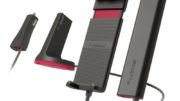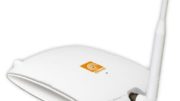Look, I’m not saying that they won’t. The truth is that if you watch pay-per-view movies on DIRECTV there might be a problem if your internet service provider isn’t generous with data.
Here are the details
DIRECTV’s DVRs want to be connected to the internet. A lot of their enhanced services depend on it. With the latest Genie DVRs, you’ll get a lot of popups if you’re not internet connected. So it’s not unimaginable that a DIRECTV system could actually suck down 10-20GB of data per month just from doing nothing. That number’s pretty high but it’s not impossible depending on how you search. The big killer though is pay-per-view. DIRECTV has two pay-per-view systems: one is satellite-driven, the channels between 100 and 200. Those channels don’t suck up any of your data. However, if you want true on-demand programming, whether it’s a pay-per-view movie or any of the 30,000+ programs available from DIRECTV, they all come over the internet. If you use the Restart feature to rewind a program from before you tuned to it, that also uses your internet.
The invisible killer
OK, that sounds a bit dramatic. But if you are using the Restart feature to go back in time before you tuned into a program, it’s going to put a lot of megabits through your router. A lot of work has gone into making that process seamless. You switch nearly instantly from a live, satellite-delivered program to one that’s recorded and streamed. It works so well that it can be easy to forget it’s even happening… until it hits your data cap.
DIRECTV programming uses variable bit rate, so every program is different. However, as a general rule of thumb, figure about 3-5GB per hour of programming. A movie could be more depending on the quality level. DIRECTV 1080p programming doesn’t be definition take up more space but often times those movies are set up to be a little higher quality than your garden variety home show.
So, it’s pretty easy to see how as few as 5 pay-per-view movies a month could eat up a stingy data cap, and let me tell you the issue is much more noticeable with 4K. Most 4K programming is downloaded not streamed at the moment and it’s looking like 4K could be 20-40GB per hour depending on the quality level.
How to deal with this
There is one way to make sure that your DIRECTV DVR isn’t sucking up data is to disconnect it from the internet. This means finding the point of connection (if it’s a physical thing) and disconnecting it, or resetting the DVR’s network settings so it can no longer see a wireless network. That’s the only way to deal with it from the DVR side. If you’re a network whiz, you may be able to set access restrictions from your router which could still let you use some advanced services without completely blowing your data allowance for the month.
Another, better, choice, is to pick a better internet service provider. Our commercial and activations arm, Signal Connect, can help you get the best internet possible at the best price. Check out your options and find out more here.
Does DIRECTV traffic count over AT&T internet?
For the most part, DIRECTV downloads still count toward data caps, even on AT&T systems that have them. There’s a philosophy called “zero rating” that was prevalent in the last four years that could have changed that. Zero rating was the process of not charging customers for traffic from your own network. It was originally intended to make sure that you didn’t get charged for informational text messages from your carrier. However, it bloomed and changed to the point where internet service providers and cell carriers were using it liberally.
Zero rating is still allowed in some states, and in other states, local net neutrality laws don’t allow it. So I would not count on it to save you in this case.
Questions? Need help?
Call the experts at Solid Signal. We can help you make the best choices for internet and satellite service! With the right support, you can make sure you never hit a data cap while enjoying the entertainment you want. It just takes one call to 888-233-7563. Or, if it’s after East Coast business hours, fill out the form below.





